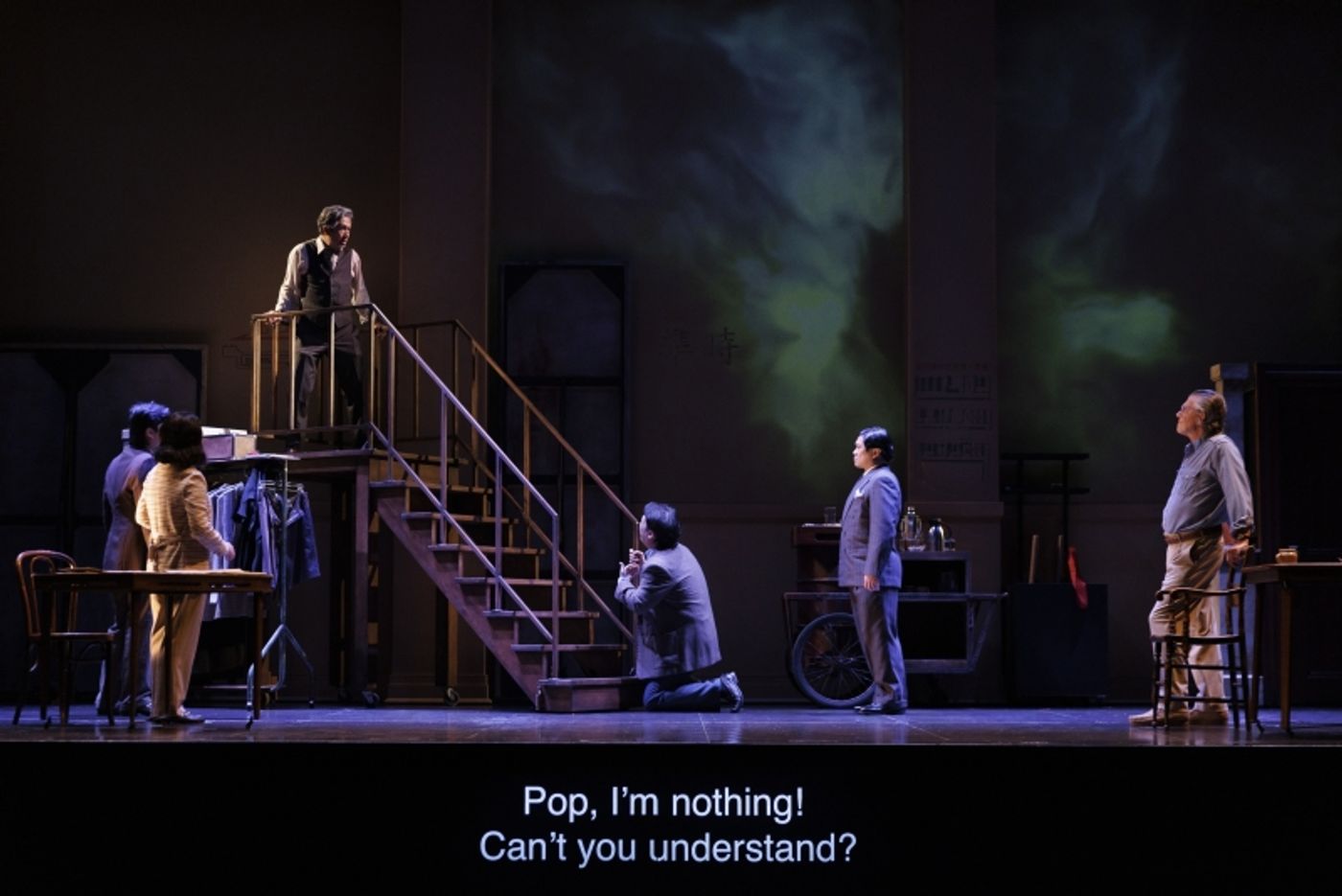Review: SALESMAN IN CHINA at National Arts Centre
Don’t miss your opportunity to see this gorgeous production with its original cast - on stage though January 25th at the Babs Asper Theatre.
%20and%20Adrian%20Pang%20%E5%BD%AD%E8%80%80%E9%A0%86%20as%20Ying%20Ruocheng%20(front-right)%20with%20from%20left%20%E9%83%9D%E9%82%A6%E5%AE%87%20Steven%20Hao%20as%20Li%20Shilong%2C%20Phoebe%20Hu.jpg?format=auto&width=1400)
Ying Ruocheng (front-right) with from left 郝邦宇 Steven Hao
as Li Shilong, Phoebe Hu.
Photo by David Hou.
NAC English Theatre presents the Stratford Festival’s production of Salesman in China, written by Canadian playwrights, Leanna Brodie and Jovanni Sy for two weeks only at the National Arts Centre.
Arthur Miller’s acclaimed play, Death of a Salesman, was written in 1949. The story is about Willy Loman, a travelling salesman from Brooklyn, and his relationship with his two sons. Despite his optimism, Willy is struggling to live the American Dream: a comfortable existence with a steady income, a nice home, with a wife and kids who have been raised to be successful in their own right. In 1949, China was still in the midst of a civil war and socialist revolution. By 1983, the chasm between the two countries had widened even further. The United States was enjoying increased economic growth and was still considered to be a land of opportunity, while the scars inflicted upon China’s population during the Cultural Revolution were still raw. Nevertheless, in 1983, Arthur Miller travelled to Beijing to direct Death of a Salesman and present it to Chinese audiences for the first time. It is at this point where Brodie and Sy’s Salesman in China begins.
%20and%20Tom%20McCamus%20as%20Arthur%20Miller%20in%20Salesman%20in%20China%20Stratford%20Festival%202024%20Photo%20David%20Hou%202%20(1).jpg?format=auto&width=1400)
as Arthur Miller in Salesman in China Stratford Festival 2024
Photo by David Hou.
The play’s actors question Miller (Tom McCamus); are they meant to be Chinese people in China, American people in the United States, or Chinese people in the United States? Miller waves off the question saying that it doesn’t really matter because the play’s message is about humanity. Still, the actors remain unsure; conflicts and misunderstandings due to the cultural differences emerge and tempers start to boil over. Infidelity is not discussed, American football is virtually unheard of, and neither travelling salesmen nor life insurance exist in China. How can the audience possibly relate to these characters?
Ying Ruocheng (Adrian Pang) has been cast as Willy. Despite their outward differences, similarities become apparent between Willy and Ying. Ying is anguished by memories of what transpired during the revolutions, and is haunted by the ghost of his father, a Catholic school teacher who had to flee Communist China and with whom Ying refused to accompany. The Communist Party expects a Ying and his wife, Wu (Jo Chim) to report back on Miller and his wife, Inge’s (Sara Orenstein) actions while they are in the country. Ying is reluctant to betray his friend, but has no real choice.
Ying and Miller must reconcile their differences, face their own buried truths, and come to the self-realization, forgiveness, and acceptance that will allow each to continue moving forward. The play itself becomes a symbolic bridge over the chasm, allowing its audience to see the shared humanity of the two cultures.
The acting is stellar across the board, with Pang and McCamus balancing each other perfectly. Pang's impassioned performance makes your heart ache, as both his characters' vulnerability is exposed as they are each weighed down by baggage.

Photo by David Hou.
The staging is spectacular, with an elaborate set (designed by Joanna Yu) that shifts quickly and effortlessly between scenes. Impressive direction (also by Sy) coupled with lighting effects (Sophie Tang) use the stage to its maximum potential and heighten the sense of drama, whether it is redirecting the audience’s attention from the main scene to a flashback sequence, highlighting a character’s inner turmoil, or recreating the classic imagery from Death of a Salesman in the opening and closing scenes. The effectiveness of an automobile scene using only a couple of lights, sound, and some haze is absolutely incredible.
While it may be helpful to have some knowledge of Death of a Salesman, it is not needed to appreciate and understand Salesman in China, as all important background information is provided to the audience.
Salesman in China is performed in both Mandarin and English, with surtitles for both languages. The surtitles are placed at stage level, making them effortless to read and never detracting from the performance. Even though the Brodie and Sy could have written the play entirely in English to obtain broader initial audience appeal, the shows' multilingual format gives it a richness and sincerity that would have been otherwise lacking. The quality of the production and the heart of the story will take this show to heights higher than even Willy could have dreamed.
I am truly excited to see where Salesman in China goes next; this play would be equally at home on the Broadway stage as at the NAC or the Stratford Festival. Don’t miss your opportunity to see this gorgeous production with its original cast while you can. Salesman in China is on stage at the NAC’s Babs Asper Theatre through January 25th. Click here for more information or click the link below to buy tickets.
Reader Reviews
Videos

